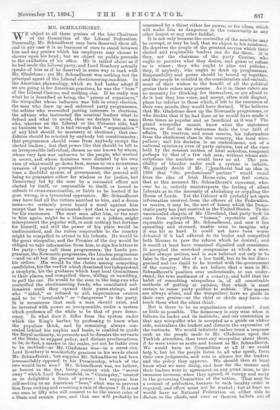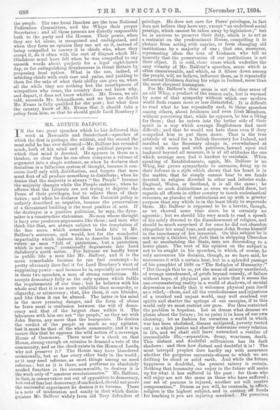MR. SCHNADHORST.
WE object to all these praises of the late Chairman of the Committee of the Liberal Federation. Personally, Mr. Schnadhorst may have deserved them all, and in any case it is no business of ours to stand between him and any praises which his employers may choose to shower upon his head ; but we object on public grounds to the exaltation of his office. He is talked about as if he had made the Liberal party, and Lord Rosebery actually speaks of him as if he deserved in some way to rank with Mr. Gladstone; yet Mr. Schnadhorst was nothing but the principal agent of the Liberal electioneering-machine. In the American phraseology, which we had better adopt if we are going in for American practices, he was the " boss" of the Liberal Caucus, and nothing else. If he really was what he is described as being, the "prince of organisers," the wirepuller whose influence was felt in every election, the man who drew up and enforced party programmes, the arbiter who reconciled jarring interests in elections, the adviser who instructed the nominal leaders what to defend and what to avoid, then we declare him a man who, whether on the Liberal or the Unionist side, had no business to be. It is bad enough that " organisation " of any kind should be necessary at elections ; that can- didates should be selected by anybody but constituencies ; that programmes should come from anybody except the elected leaders ; but that power like this should be left to an irresponsible individual, chosen no one knows by whom, whose very face was unknown to the people, who worked in secret, and whose decisions were dictate& by his own view of what would go down best, seems to us a monstrous invasion of popular prerogative. Democracy is at any time a doubtful system of government, the general will being no guarantee either for wisdom or for justice, but Democracy led by the nose by a concealed officer not elected by itself, or responsible to itself, or bound to submit to cross-examination, or liable to be hooted if he goes wrong, is a tyrannical oppression. Mr, Schnadhorst may have had all the virtues ascribed to him, and a dozen more—we certainly never heard a word against him except that he was opinionated—but that is no guarantee for his successors. The next man after him, or the next to him again, might be a blunderer or a jobber, might misrepresent the popular will, or seek nothing but fortune for himself, and still the power of his place would be undiminished, and the rulers responsible to the country might be compelled to attend to his behests. He would be the great wirepuller, and the Premier of the day would be obliged to take information from him, to sign his letters to the party—they call them programmes, the Leeds pro- gramme, the Newcastle programme, the London programme —and on all but the gravest issues to act in obedience to his orders. His would be the choice among competing candidates, his the verdict which dismissed too independent a neophyte, his the guidance which kept local Committees in their places, and compelled them, willing or unwilling, to pull the ear. He would be the man in the long-run who controlled the electioneering funds, who conciliated mil- lionaires until they opened their purse-strings, and who "aided," or refused to aid, impecunious orators said to be " invaluable " or "dangerous" to the party. It is monstrous that such a man should exist, and be invested with power so irresponsible, under a system which professes all the while to be that of pure demo- cracy. In what does it differ from the system under which the King's barber, by professing to know what the populace think, and by remaining always con- cealed behind his napkin and basin, is enabled to guide the Royal authority, to promote and to dismiss the servants of the State, to suggest policy, and dictate proclamations, to be, in fact, a master in the realm, yet not be liable even to be mobbed—as Mr. Gladstone was—in a street riot. Lord Rosebery is wonderfully gracious in his words about Mr. Schnadhorst; but suppose Mr. Schnadhorst had been irreconcilably opposed to his Premiership, which of the two would have won ? Mr. Schnadhorst was, we believe, as honest as the day, being content with the "secret sway" which Lord Beaconsfield, in " Coningsby," treated as so delightful a form of power ; but suppose him self-seeking as an American boss," what was to prevent him from seeking and receiving a rain of cheques ? It is not one man in fifty who will consent to be the secret ruler of a State and remain poor, and that one will probably be consumed by a thirst either for power, or for ideas, which will make him as dangerous to the community as any other despot or any other faddist.
It is not only because the controller of the machine may be corrupt, or may be bad, that we object to his existence. He deprives the people of the greatest service which their elected and responsible leaders can .do for them. It is they, not the chairman of the party Caucus, who ought to perceive what they desire, and grant or refuse as is wisest ; they who ought to plan out policies ; they, if anybody, who ought to draw up programmes. Responsibility and power should be bound up together, and the people be entitled in the consideration and embodi- ment of their wishes to the benefit of all the political genius their rulers may possess. As it is, those rulers see no necessity for thinking for themselves, or are afraid to do it lest they lose votes, and accept, often with disgust, plans far inferior to those which, if left to the resources of their own minds, they would have devised. Who believes that Mr. Gladstone drew up the Newcastle programme, or who doubts that if he had done so he would have made it three times as popular and as beneficial as it was ? The grand wirepuller cannot know what the statesman knows, or feel as the statesman feels the true drift of affairs. He receives, and must receive, his information from the shallowest class in the country, the local wire- pullers ; and his decision is an embodiment, not of a national opinion or even of party opinion, but of the view held by the noisiest section of local nobodies, tempered perhaps by that of a few rich men, without whose sub- scriptions the machine would have no oil. The pos- sibility of blunder under such a system is infinite. We greatly doubt if Mr. rAinadhorst had an idea in 1886 that "the predominan0 partner" would recoil from the idea of Irish Home-rule, and feel certain that at this moment Mr. Schnadhoret's successor, who- ever he is, entirely misinterprets the feeling of silent Liberals as to the necessity of abolishing or crippling the House of Lords. Yet the Cabinet will probably act upon. information received from the officers of the Federations. to receive, it may be, the sort of lesson which the Demo-. cratic party has just received in the United States. To the unconcealed chagrin of Mr. Cleveland, that party took its. cues from wirepullers, "bosses," reputable and dis- reputable replicas of Mr. Schnadhorst, and now it lies sprawling and stunned, unable even to imagine why it was hit so hard. It could not have been worse defeated if it bad. adhered to its leader and compelled both Houses to pass the reform which he desired ; and it would at least have remained dignified and consistent. It accepted the wretched compromise at which a wire- puller always arrives, and is now believed not only to be- false to the great idea of a low tariff, but to be too disor- ganised and too timid to be trusted with the government of the country. We do not believe that a man in Mr. Schna.dhorst's position ever understands, or can under-- stand, the true sentiment of a country, and hold that the habit of consulting wirepuller s is, of all conceivable methods of getting at opinion, that which is most certain to cause party politics to wobble. The masses are always silent, and the wireptillers have no guide in their own genius—as the chief or chiefs may have—to teach them what the silent think.
But is there to be no organisation of electors Just as little as possible. The democracy is only wise when it follows its leader and its instincts ; and our contention is that any -wirepuller who is accepted as a guide on either- side, neutralises the leaders and distorts the expression of the instincts. We would infinitely rather trust a response such as the people made to Mr. Gladstone upon the Turkish atrocities, than trust any wirepuller about them, if he were twice as acute and honest as Mr. Schnadhorst. We would have no Committees at all if we could help it, but let the people listen to all who speak, form. their own judgments, and vote in silence for the leaders and the policy they approve. We should then at least, know what we were doing, and how far the masses and their leaders were in agreement on any great issue, to the immense increase, when they agreed, of energy and unity in the governing Committee of the nation. That may be, a counsel of perfection, because in each locality order is required, and effort must not be wasted ; but at least we would have no National Federation on either side to dictate to the chiefs, and. con or theaten ballots out of the people. The two front Benches are the true National Federation Committees, and the Whips their proper Secretaries ; and all these persons are directly responsible both to the party and the Houses. Their power, when they are let alone, is recognised and undisguised, and when they form an opinion they can act on it, instead of being compelled to convey it to chiefs who, when they accept it, do it often with the sort of disgust which Mr. Gladstone must have felt when he was compelled to say smooth words about projects for a legal eight-hours day, or for extinguishing drunkenness in Great Britain by proposing local option. What is the use, indeed, of selecting chiefs with such care and pains, and yielding to them for the sake of what their ability can give us, when all the while they are nothing but the mouthpieces of wirepullers who come, the country does not know why, and depart, it does not know whither. Mr. Evans, we are told, succeeds Mr. Schnadhorst, and we have no doubt Mr. Evans is fully qualified for the post ; but what does the country know of Mr. Evans that it should take a policy from him, or that he should guide Lord Rosebery ?



















































 Previous page
Previous page